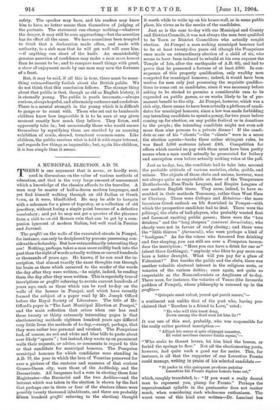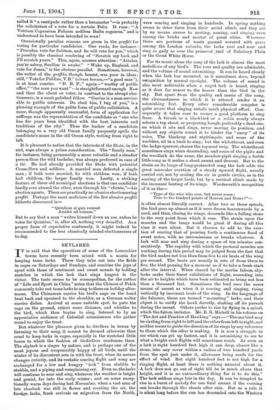used in discussions on the value of various methods of
education, and that is the very large amount of amusement which a knowledge of the classics affords to the traveller. A man may be master of half-a-dozen modern languages, and yet find himself walking through an old Italian or Greek town, as it were, blindfolded. He may be able to bargain with a salesman for a piece of tapestry, or a collection of old jewellery, without losing a single point because of a defective vocabulary; and yet he may not get a quarter of the pleasure from a visit to an old Roman ruin that can be got by a com- panion ignorant of modern Italian, but well read in Persius and Juvenal.
The graffiti on the walls of the excavated streets in Pompei, for instance, can only be deciphered by persons possessing con- siderable scholarship. But how extraordinarily interesting they are! Nothing, perhaps, takes a man more swiftly back into the past than the sight of words actually written or carved hundreds or thousands of years ago. He knows, if he can read the in- scription, that almost exactly the same thoughts run through his brain as those which occurred to the reader of the words the day after they were written,—he might, indeed, be reading them the day after they were written. This is especially true of inscriptions or graffiti referring to events current hundreds of years ago, such as those which can be read to-day on the walls of the houses in Pompei, and which have recently formed the subject of a paper read by Mr. Joseph Offord before the Royal Society of Literature. The title of Mr. Offord's paper is "The Last Municipal Election at Pompei," and the main reflection that arises when one •has read these twenty or thirty extremely interesting pages is that electioneering methods eighteen hundred years ago differed very little from the methods of to-day,---except, perhaps, that they were rather less personal and virulent. The Pompeians had, of course, no red and white and blue bills to paste about over likely " spaces " ; but instead, they wrote up on prominent walls their requests, or advice, or comments in regard to this or that candidate for municipal honours. The • Pompeian municipal honours for which candidates were standing in A.D. 79, the year in which the lava of Vesuvius preserved for ever a picture of the customs and manners of that curious Gasteco-Oscan city, were those of the Aedileship and the Duunivirate. All burgesses had a vote in electing these four Magistrates—the Duumviri and the two Aediles—and the interest which was taken in the election is shown by the fact that perhaps one in thrtse or four cif the electors (there were possibly twenty thousand inhabitants, and there are probably fifteen hundred graffiti referring to the election) thought Just as is the case to-day with our Municipal and County and District Councils, it was not always the men best qualified to be Town or District Councillors who actually sought election. At Pompei a man seeking municipal henours had to be at least twenty-five years old (though the Pompeians once made an extraordinary election of a child of six, who seems to have been induced to rebuild at his own expense the Temple of Isis, after the earthquake of A.D. 63), and had to prove that he possessed a fortune of at least E800. In con- sequence of this property qualification, only wealthy men competed for municipal honours; indeed, it would have been useless for men only just possessing the requisite qualifica- tions to come out as candidates, since it was necessary before asking to be elected to promise a considerable sum to be expended on public games, or on works likely to be of per- manent benefit to the city. At Pompei, however, which was a rich city, there seems to have been actually a plethora of candi- dates for municipal honours, since a law was made forbidding any intending candidate to spend a penny, for two years before coming up for election, on any public festival or in donations to the people ; the intending candidate might not even ask more than nine persons to a private dinner ! If the candi- date or one of his "clients "—the "clients" were in a sense the election agents—broke these rather stringent rules, he was fined 5,000 sesterces (about 240). Competition for offices which carried no pay with them must have been pretty severe when a man could actually be prosecuted for bribery and corruption even before actually seeking votes at the poll.
Just as to-day, too, the candidate had to take into account the probable attitude of various societies, clubs, guilds, and unions. The objects of these clubs and unions, however, were not always quite so respectable as those of the Temperance Brotherhoods, Free-Trade Leagues, and Empire Leagues of our modern English times. They seem, indeed, to have re- sembled in their methods Tammany, rather than West Ham or Chertsey. There were Collegia and Hetairiae—the more luxurious Greek outlook on life flourished in Pompei—with which the prospective candidate had to deal. There were the pilicrepi, the clubs of ball-players, who probably wanted first and foremost exciting public games ; there were the "late drinkers" and the "long sleepers" (universi dormientes), who clearly were not in favour of early closing; and there were the "little thieves" (furunculi), who were perhaps a kind of "hooligans." As for the voters who favoured free drinking and free sleeping, you can still see over a Pompeian tavern- door the inscription : "Here you can have a drink for one as" (about three farthings); "anybody who likes to pay more can have a better draught. What will you pay for a glass of Falernian ? " But besides the guilds and the clubs, there was another valuable electoral interest in the religious sects, or votaries of the various deities; once again, not quite so respectable as the Nonconformists or Anglicans of to-day. There were, for instance, the votaries of Venus (the favourite goddess of Pompei), whose philosophy is summed up in the graffito- " Qaisquis amat valeat, pereat qui parcit amare,"— a sentiment not unlike that of the poet who, having pro- claimed that "Bacchus is a friend to Love," cried:
"Ho who will this toast deny, Down among the dead men let him lie !"
It was one of this sect, probably, who was responsible for the really rather poetical inscription :— "Alliget his auras si quis objurgat amantes, Et vetat assiduas currere fontia aquas,"— • "Who seeks to thwart lovers, let him bind the breeze, or forbid the springs to flow." Not all the electioneering poets, however, had quite such a good ear for metre. This, for instance, is all that the supporter of one Lucretius Fronto
could manage, writing in praise of his selected candidate "Si pudor in vita quicquam prodesse putatur Lucretius his Pronto dignus honore bene eat,"
which, roughly translated, is : "If you want a really decent man to represent you, plump for Fronto." Perhaps the superabundant syllable in the pentameter does not matter much, when considering such wholesome enthusiasm. The worst verse of this kind ever written—Dr. Lanciani has
called it "a centipede rather than a hexameter "—is probably the solicitation of a vote for a certain Felix. It runs : "A Vettium Caprasinm Felicem aedilem Balbe rogamus," and is understood to have been intended to scan!
Occasionally peculiar reasons are given in the graffiti for voting for particular candidates. One reads, for instance : " Proculus, vote for Sabinus, and he will vote for you," which is possibly the classical rendering of "Scratch my back and I'll scratch yours." This, again, arouses attention: "Attalus, you're asleep, Suellius is awake." "Wake up, England, and vote for Jones," is the obvious parallel. Sometimes, however, the writer of the graffito, though honest, was poor in ideas; still, " Vote for Publius, V.B." (virum, bonum,—"a good man"), is at least concise. "B. R. P.," again—" worthy of public office," "the man you want "—is straightforward enough. Now and then the client or voter, in contrast to the abrupt elec- tioneerer, is a most polished fellow. "Gavius is a man service- able to public interests. Do elect him, I beg of you," is a pleasing example of the polite form of public solicitation. A rarer, though apparently successful, form of application for suffrage was the representation of the candidate as "one who has for years been identified with the best interests and traditions of the city." Thus the backer of a candidate belonging to a very old Oscan family purposely spells the candidate's name in the old Oscan style, writing from right to left.
It is pleasant to notice that the interests of the State, in the end, ware always a prime consideration. The "family man," for instance, being presumably a more valuable and a steadier person than the wild bachelor, was always preferred in case of a tie. He had already provided the State with potential Councillors and soldiers. A married man defeated a single man ; if both were married, he with children won; if both had children, the larger family won. Lastly, a striking feature of these old municipal elections is that one candidate hardly ever abused the other, even through his "clients,"—his election agents. There are practically no abusive electioneering graffiti. Perhaps the most malicious of the few abusive graffiti hitherto discovered is- " Quintiom si quis recant Assidet ad asinum."
But to say that a man "writes himself down an ass, unless he votes for Quintius," is, after all, nothing very dreadful. As a proper form of superlative contumely, it might indeed be recommended to the less classically minded electioneerers of to-day.
SKYLARKS.











































 Previous page
Previous page